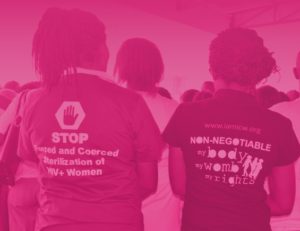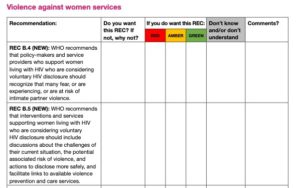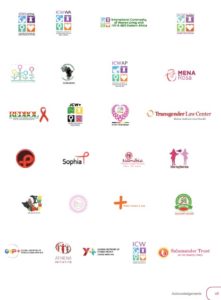By Sita Shahi, Anandi Yuvaraj, Florence Anam, Sophie Dilmitis, Jenifer Gatsi, Lillian Mworeko, Francine Nganhale, Dorothy Onyango, Assumpta Reginald, Martha Tholanah, Patricia Ukoli, Lucy Wanjiku, Tendayi Westerhof, Rita Wahab, Susan Bewley, Rico Gustav, Bakita Kasadha, Angelina Namiba, Mercy Ngulube, Luisa Orza, Silvia Petretti, Sophie Strachan, Marijo Vazquez, Alice Welbourn, Svitlana Moroz, Olena Stryzhak, Arely Cano, Cecilia Chung, Tyler Crone, Olive Edwards, Mariana Iacono, Gracia Violeta Ross
Sexual and Reproductive Health and Rights for Women Living With HIV
As a diverse group of women living with HIV from around the world and key partners, we celebrate the publication of a Checklist we created to support the full implementation of the World Health Organisation (WHO) 2017 Consolidated guideline on the sexual and reproductive health and rights (SRHR) of women living with HIV. With our full blessing, the Checklist, was endorsed by UNAIDS, UNFPA, UN Women, and OHCHR and is now an official UN document on the WHO website.,
Our engagement stretches back to July 1992, when women living with HIV from around the world stormed the stage at the International AIDS Conference in Amsterdam. We had been invisible, as was the impact of HIV on us. We insisted that researchers and policy makers started to explore what HIV and AIDS meant for women too.
Even now, over half of all adults living with HIV globally are female. Four out of five young people in east and southern Africa who acquire HIV are girls and young women. Yet, what happens to our bodies and our rights are not high up enough on the priority list or agendas of key policy-makers, researchers or health-care providers. Most national and international policies and programmes focus on top-down, bio-medical indicators and outcomes, driven by numbers rather than by rights. We are often treated as vessels and vectors, a means to an end, rather than as sentient human beings with intrinsic rights to healthcare and well-being across our lifespan.
In addition to having HIV, accessing SRHR is even more challenging for women who also experience violence or mental health issues; who live in countries which criminalise those who express a different sexual orientation or gender identity; who use drugs; or engage in sex work; or have disabilities; women who are migrants, incarcerated, or Indigenous. Many of these key affected women of all ages regularly experience marginalisation and isolation, through widespread harmful social norms and policies that leave them unprotected. Such norms and policies make it even harder for these diverse women to decide what happens to their bodies.
It is marginalisation and the absence of key human rights that make so many women vulnerable to HIV. As the recent Evidence for Contraceptive Options and HIV Outcomes (ECHO) trial results show, the high levels of HIV, amongst the women in treatment and control arms alike, reaffirm how little is being achieved to protect women from HIV. A good place to begin to right the wrongs would be to safeguard our own intrinsic SRHR, whilst trying to support our own efforts to enable others around us to remain HIV-free.
Fig. 1: Image from the Checklist front cover: women in Namibia campaigning against their forced/coerced sterilisation. © Namibia Womens Health Network
The Guideline Process
In October 2013, the WHO Department of Reproductive Health and Research (RHR) approached us to conduct a values and preferences survey to inform a guideline update process. A global group of women living with HIV, and our partners, created the Global Values and Preferences Survey. The resulting report informed and shaped what became the new 2017 guideline.
One survey participant commented: “I found the experience to be cathartic….. It was meaningful to answer questions that truly reflected my experiences both as a girl and young woman before HIV and since my diagnosis. Even though there were questions about violence and trauma that could have felt difficult, the fact that the survey was written by and for women living with HIV and in a tone that is empowering rather than victimizing, made my participation feel good and made me feel that I could be really honest in my answers.”
Key findings highlighted how many women have experienced intimate partner violence before, because of, or since acquiring HIV. Many women reported mental health issues related to HIV status and on-going issues with antiretroviral treatment side-effects. Accordingly, the 2017 Guideline gave prominence to safety, respect, and support for our physical and mental well-being; each section highlighted our survey’s findings alongside findings from academic peer review journals.
Despite its importance, the 2017 guideline roll-out to full implementation has been hampered through lack of political will and funding. WHO has no process to support countries to implement its guidelines; the launch consisted of webinars for different regions and translation into four other languages. Whilst helpful, webinars are never enough.
So, with WHO RHR Department seed-funding, we developed the Checklist. In 2018 UNAIDS Kenya funded a pilot workshop, hosted by WOFAK. The pilot showed the challenge of discrimination faced by women living with HIV, even in healthcare settings. Women are driven away from care, resulting in further blame and labelling as ‘defaulters’. This is another widespread global treatment access barrier which the guideline highlighted.
Dr Tedros Adhanom Ghebreyesus, Director-General, WHO said “Thank you for sharing the … Checklist …. The development of this important tool is a significant achievement – please rest assured that I, and WHO, will make every effort to support Member States in its implementation so that [SRHR] can be realized by women throughout the life-course.”
Meanwhile, we asked him to set up a standing advisory group of women living with HIV, in all our diversity, to advise WHO on all its policies and processes as they relate to us. This was formed earlier this year.
Disappointingly, despite all these advances, in May 2018 WHO’s HIV Department issued a signal about dolutegravir; through its wording, this severely undermined the rights of all women “of child-bearing potential” (i.e. aged 15-49) in many countries to access this effective antiretroviral drug. Whilst the newly updated guidance now affirms women’s rights to informed choice, and important new recommendations around responses to pregnancy safety signals are being advanced, we wait to see how long it will take for women around the world to benefit from this vital message. This example shows our long, uphill struggle to ensure safety, respect, support and meaningful involvement are upheld in our own healthcare.
Fig. 2 extract from the Checklist: a ‘traffic lights’ exercise, to enable workshop participants to review the new guideline together, in comparison with their own existing national guidance.
Meaningful Engagement: The Future
Whilst the UN publication of this Checklist is an important milestone, we know that what really effects change is action. We hope that women living with HIV will now be supported by technical partners to advocate for change at national levels.
Now is the time to put action behind slogans and ensure that no-one is left behind. We require ethical, effective and sustainable opportunities to support our access to respectful services. Support for our leadership and meaningful engagement are essential.
On behalf of Dr Tedros, Dr Flavia Bustreo, recognised this:
“The woman-centred approach adopted in this important guideline is in line with the leadership priorities of WHO. The process that was followed for the development of this guideline is an approach that we hope can be replicated elsewhere as a best practice for the Organization. This approach further reflects WHO’s commitment to a more person-centred approach and is an enabling initiative that has the potential to support delivery of tangible and lasting public health impact to achieve universal health coverage and improve wellbeing for all.
….this model is the first of its kind and the Department of Reproductive Health and Research (RHR) and the Special Programme for Human Reproduction (HRP) is collaborating with the GRC and Gender, Equity and Rights (GER) team to explore how a similar process can be replicated, where possible. In addition, I have also requested that this example of social mobilization is considered within the context of the current in-house discussions on initiatives for change.” (August 2017)
We call on everyone to ensure that this approach is institutionalised and replicated across WHO. Ours was not a top-down WHO-led survey but rather a powerful, empowering, and cathartic process, shaped by those most affected and grounded in our diverse realities. Our rich knowledge and expertise was not dismissed as grey literature but given equal weight throughout the resulting guideline. We need more than a few individuals who understand the importance of embracing key principles around meaningful engagement for us to advance foundational work led, informed, and in true partnership with the most affected stakeholders.
It is time that countries also respect and implement the women-centred, rights-based approach, as outlined in the Checklist. Policies will only work when they recognise our rights, thereby making investments effective. Listen to us. Learn from this example: engage us as active participants; respect our autonomy; give us the information we need; enable us to make informed choices; and support us in those choices – whatever they may be. This is the route to effective, ethical and sustainable policy-making and programming. All the evidence indicates that this strategy would be a ‘win-win’.
In Sum
We call on all stakeholders to support our collective efforts:
- Review and ensure that your own policies and practice measure up to the recommendations and good practice statements in the 2017 WHO Guideline;
- Share this blog with your colleagues, associations, ministers of health and gender, justice and finance; with National AIDS Control Programmes; and with networks of women living with HIV.
- Support our efforts and advocate for full implementation of the 2017 guideline in your countries. You will advance women’s intrinsic rights: and also improve the lives of our children and other community members – whom many of us continue to care for.
We will continue to advocate for change. As healthcare professionals, policy makers, researchers and donors, the power to make this happen lies with you too. Please consult us and use your power for our benefit.
Declaration Of Interest: Salamander Trust and associates received funds from WHO for work on the global values and preferences study and the development of the original checklist. Other than that, we all have no declaration of interests other than that we are all living with and/or campaigning on the sexual and reproductive health and rights of women living with HIV.
About the Checklist:
The publication is a joint UN document, supported by WHO, UNAIDS, UNFPA and the Office for the High Commission for Human Rights. The publication was developed by Salamander Trust Associate Sophie Dilmitis, with funding from WHO Department of Reproductive Health and Research (RHR) and guidance from Dr Manjulaa Narasimhan of RHR. The full list of its organisational signatories, whose logos also appear in the Checklist (see below), is as follows:
Regional / country level: Eurasian Women’s Network on AIDS (EWNA); ICW Asia Pacific; ICW Central Africa: ICW Eastern Africa; ICW Latina; ICW West Africa; ICW Zimbabwe; Ikatan Perempuan Positif Indonesia (IPPI) / Indonesia Positive Women Network; Jamaica Community of Positive Women; MENA Rosa; REDBOL (Bolivian Network of People Living with HIV); Namibia Women’s Health Network; Pan African Positive Women’s Coalition—Zimbabwe; Pangea Puerto Rico; Positive Young Women Voices; Positively UK; Sophia Forum; Transgender Law Centre; Women Fighting AIDS in Kenya (WOFAK); Zimbabwe Women Living with HIV National Forum.
Global level: ATHENA Network; Global Network of People Living with HIV (GNP+); Global Network of Young People Living with HIV (Y+); ICW Global; Salamander Trust.


